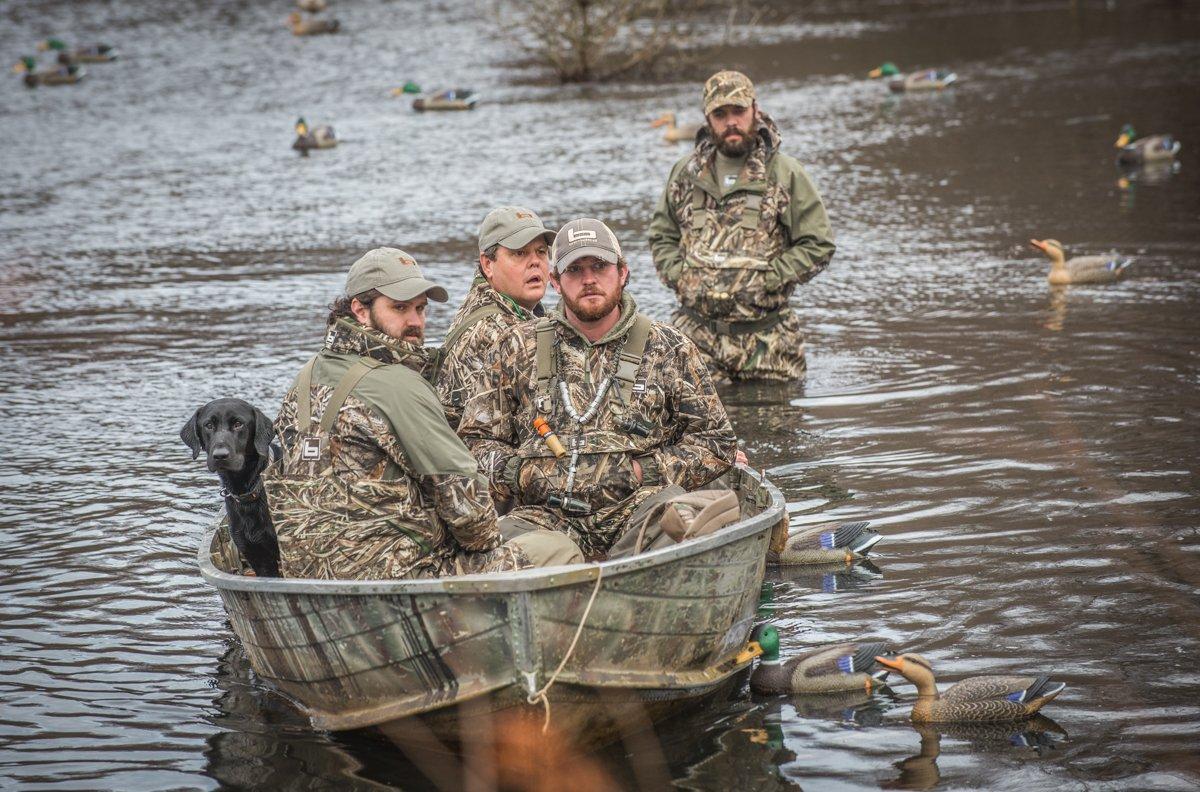Find happiness (and birds) by following these steps
It might be the most anticipated day of the year, but you hate it.
Go ahead. It's OK. Admit that you love yet despise the opening day of duck season if you hunt public water.
You detest the crowds, loathe the skybusters and can't stand the circus atmosphere. You can't work a flock without having some goofball — who pushed into the reeds 65 yards downwind from you 10 minutes before shooting light, mind you — unload on the birds when they're in the stratosphere. And do those kids have to hail and comeback call every time a black dot appears on the horizon?
Yet you usually see plenty of ducks, and you shoot quite a few some years. Further, you've waited all year to hit the marsh again, and you feel compelled to hunt. So you return to hard-hunted public marshes year after blood-boiling year.
But there's hope. By adjusting your planning and mindset, you can find happiness opening day. Here's how.
Counting Coots?
The obvious step to enjoying opening day is to avoid the crowds on hard-hunted lakes, rivers and public marshes. That has become more difficult in recent years, but you can still do it.
You might try the approach my buddies, in-laws and I used for years: Get up long before anyone else, claim your spot, and wait an eternity for the opening bell to sound. We experienced some excellent opening-weekend mallard shoots using that method. However, it has obvious drawbacks.
First, you must sleep overnight in the marsh or get up at 1 a.m. to beat the crowds in many areas. Most folks — especially those who are married, have children or possess some sanity — cannot do this. Also, as mentioned, even if you slide your skiff into a hidden pothole at 3 a.m. opening day, there's nothing to prevent some mope in a silver johnboat from throwing out his decoys 50 yards from your setup right before the action starts.
If you don't relish a night in the swamp, the only ways to escape the opening-day throngs are to forget about traditionally crowded waters or go where other folks won't.
Scout New Directions
Opening day is full of tradition, and folks like hunting familiar spots. It's human nature. And sure, those popular spots gained notoriety because they usually hold lots of ducks. But hunting these high-traffic areas can lead you right back to familiar opening-day frustrations.
Muck Fieldblazer II Mid All-Terrain Sport Boot in Realtree Xtra
To avoid this trap, start searching for new opening-day digs long before the season. First, live by a golden rule: If an area has a public boat launch, think twice about hunting it. Then, check out lists and descriptions of wildlife areas or public waters from your state game and fish agency, and view aerial photos of to find little-known, out-of-the-way areas that might hold ducks. Many won't be worth a darn, of course, but a surprising number will.
Look for small ponds or pothole lakes, such as those in game-production areas, state natural areas, state or national forests or timber-company land open to public hunting. Also, seek remote sloughs, backwaters or wide main branches of creeks and small rivers. Tiny flowages sometimes feature pockets of good waterfowl habitat, and many small wild rice-choked lakes will attract birds.
These B-list spots probably won't hold 1,000 ducks, but they could hold several dozen, and they might not attract opening-weekend hordes, either.
After you've identified possible hunting spots, talk with state biologists. They can probably provide insight on habitat and bird numbers at many areas. If nothing else, they can tell you which areas typically receive substantial pressure early in the season. Cross those spots off your list.
When you've narrowed your search to several likely options, it's time to scout.
Walk to or paddle through these spots — remember, you're trying to avoid spots that are easily accessible via motorboat — and note areas that hold birds or feature good cover. Determine a plan of attack, including your travel route into and out of the area.
Return to good-looking spots a week or so before the season to see if other hunters have built blinds or staked out spots. If so, you might have to resort to Plan B. If not, you're probably set for an opening-day adventure.
Temper your expectations when hunting a new spot. If opening day isn't a smashing success, just enjoy the experience and learn from it. Shooting a couple of ducks in peace is always better than battling the crowds.
Familiar But Different
Of course, it's easy to talk about finding new spots. Work and family obligations often limit scouting time, and, good intentions aside, you're often stuck at a popular public spot opening morning. This isn't ideal, but you can still make it work by overhauling your approach.
Don't focus on spots that seem ideal for decoying ducks. Instead, set up so you're as far as possible from other hunters and, above all, avoid getting cut off by competing groups — especially downwind.
Also, forget about spots where ducks congregated before the season. Rather, hunt flight lanes birds use to escape pressure. These might include narrow pinch points between larger areas of water, hidden creek arms that connect to relatively unpressured areas or even the middle of large bays where birds might circle before heading elsewhere.
Sometimes, shoreline or vegetation features act as travel funnels for pressured ducks. I noticed this a few years ago at a favorite opening-day spot. Teal, wood ducks and even mallards consistently flew up and down the mouth of a large flowage, spooked at pressure and then often escaped by flying through an area where a narrow bay and a tiny channel met. They weren't looking to land, but they always flew through the area. One year, I abandoned my usual opening-weekend haunts and set up there, and my success increased immediately. It's not a classic spot, but it produces consistently.
Using Your Head
Although opening day is crowded and hectic, most hunters would do better if they just used common sense. But every opening weekend, most guys throw out half-baked decoy spreads, call their lungs out and convince themselves that 3.5-inch Hevi-shot will let them make 75-yard shots. Don't get caught up in that craziness.
First, remember why you're out there: to enjoy a day of duck hunting. There will be no prizes awarded to the person who shoots the most ducks, fires the most shells or limits out the quickest. Think about safety first, enjoyment second and getting birds last.
Also, don't hesitate to put that call in your pocket. Everyone around you will be blowing incessantly, mostly to no avail. After all, in many spots, opening day is nothing more than a mass exercise in pass-shooting. Do you really think mallards will hear your hail call, focus on your decoys and pitch in when there's gunfire and movement in every corner of the marsh? Save your breath, and focus instead on concealment and avoiding other hunters.
Finally, don't fall into the opening-day shooting trap. Limit your shots sure-kill ranges, and make sure you or your pooch can retrieve what you knock down. This can be tough because everyone around you will be excited and shooting volley after volley. Some guys equate a good duck hunt with the amount of shells they fired. These buffoons fill our marshes with crippled ducks every year. You probably can't influence their behavior, but you can control yours.
Conclusion
If you accomplish nothing else opening day, keep things in perspective. There will be mornings when flocks of mallards cup into your pothole or squadrons of divers fight the north wind to settle into your rig. Opening day might not be one of those days, but it can still be fun. And if you plan wisely, work hard and hunt well, you and your group might have a day to remember.
Opening day only comes once a year, thank goodness, so you might as well enjoy it.
Click here for more Realtree waterfowl hunting content. And check us out on Facebook.









